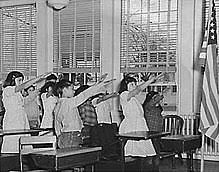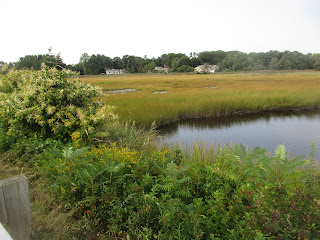The very first words of the very first amendment in the Bill of Rights are, "Congress shall make no law respecting the establishment of religion."
Unlike the Constitution of the State of New Hampshire, which says, ""No money raised by taxation shall ever be granted or applied for the use of the schools of institutions of any religious sect or denomination, ” the interpretation of what constitutes the establishment of religion is not spelled out in the US Constitution.
The ultraconservatives now occupying the Supreme Court keep whittling away at what constitutes establishment of religion.
One big trend is to allow governments to provide to religious institutions and the schools which are an inseparable part of them, the same benefits as are provided to public school students or to students at non religious private schools: For example, if you say you will provide all students in Hampton, NH with bus transportation to school, you cannot say, "well, except for those kids who want to be transported to Catholic school." (Everson) If you want to offer playground equipment to all kids in town, you have to provide it to the playgrounds on the Lutheran church campus (Trinity Lutheran Church v Comer). So the argument that you cannot discriminate when handing out goodies because some school is religious has become law.
But a new decision (Espinoza v Montana Department of Revenue) expands the area in which the state has to pay religious schools, in which scholarships made available to private schools have to be made available to private religious schools, so now a state is required to fund religious education if it provides similar grants to non religious institutions. Justice Roberts argues if you must provide playground equipment, then you must provide scholarships to learn religion, which just goes to show how Catholic education can infiltrate brain cells of almost anyone.
When and if the Court is ever packed or rearranged or infiltrated with more liberal justices, this decision will be, hopefully, one of the first to go.
In Maine, there are students who live so far from any public school the only practical schools available to them are religious schools and the state government is now facing a Supreme Court which will probably direct Maine to pay to send these kids to religious schools.
But in New Hampshire, there is a case which potentially could break the back of the establishment clause altogether when and if it ever makes it to the current SCOTUS.
In the town of Hampton, every year, the town votes to set up an account of $65,000 in the town's department of education, for the use of the Catholic Sacred Heart School. This debit card has been used to pay vouchers presented to the town from the Church, and each year about $42,000 is used to pay for a school nurse (which New Hampshire law says every school can or must make available to every student at every school in town) but $23,000 is used for computers, testing materials, textbooks and possibly painting classroom walls--it isn't clear--but for operating expenses of the school, which is owned by the diocese of Manchester, NH.
What is meant by the "establishment of religion"?
Well, if the town of Hampton declared in writing that the Catholic church was the official church of the town, choosing it over the Baptist, Congregational, Episcopalian, Methodist and Faith Community Church, most people would agree that's government (not Congress, but what applies to Congress applies to all levels of government) establishing a church.
But beyond statements, and naming rights, what else could be establishment? How about if a judge erects a huge cross in his court room or, say, places a big plaque with the 10 Commandments on his wall? Or a nativity scene at the front of the courtroom, right next to the witness stand? Or a picture of Pope Francis?
But for most state churches as they function in England or Europe the big thing is not symbols, but rather money. The Church of England gets money from the state to paint church walls, pay staff, buy computers. So if we, here in America, the land of Jefferson, Madison and Franklin, start paying for the costs of operating churches, would that not constitute an establishment of church by the state, especially if only one church were so blessed?
With the current Thomas/Alito/Barrett/Kavanaugh/Roberts Court, it's not clear they would see anything wrong with selecting one church out. They might say, well if the citizens in a town all vote for that church to be funded by taxpayers' money, would we want to interfere with the free exercise of religion by those voters who are good Catholics and choose to direct their taxes to the Church?
This is predictable.
But it does not mean it's right.
Fact is, we have for over 200 years been free of the state being beholden to any church and we have forgotten why that might be a problem.
At a recent deliberative session in town, considering defunding the church, one lady pointed out that same church school closed down a book fair because one of the books put on sale told the story of a same sex couple raising a child.
Oh, my.
The fact is, Hampton schools have failed to teach history to its folk, and they have forgot all the mischief religious wars and intrigue of popes and religious institutions have caused.
For my part, I'd recommend the TV series, "The Tudors" be shown in class. It's got lots of sex and nudity and would hold the interest of the students, but it really does show the dangers, as heads get chopped off and people get burned at the stake and villagers are impoverished trying to meet the tithes demanded of them to support the churches.
But I won't hold my breath.
Hampton is a small New England town and as Grace Metalious observed in Peyton Place religion is a volcano.
Dr. Matthew Swain, the hero, describes the Catholic and Congregationalist churches which bracketed the town like bookends as "a pair of goddamned volcanoes. Both of 'em breathin' brimstone and fire...There were three things he hated in the world, he'd said often and angrily: death, venereal disease and organized religion. In that order."
It is, of course, Dr. Swain who is put on trial at the end of the book for performing an abortion on a teen age girl raped by her step father, a set of extenuating circumstances which today's Catholic church would not find exculpatory.
We have here, in small town New England, folks who stand up at deliberative sessions and say we have funded the Catholic Church in town for 50 years and they see no reason to change that no matter what the Constitution in Washington says. And when asked if they would allow taxpayer dollars to fund any other church in town, they smile knowingly and say, "Well, if they can get enough votes for that, the way we have..."
And so we sail on, in this nation of laws.










